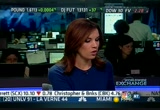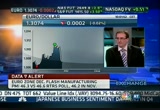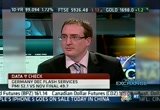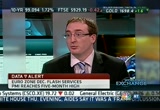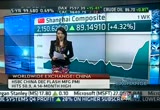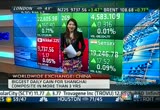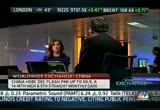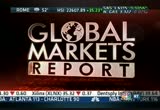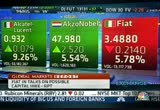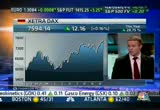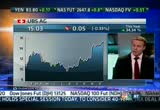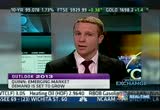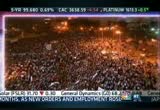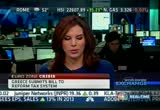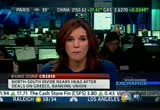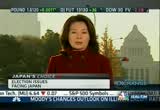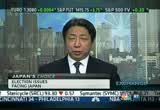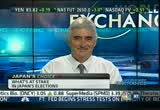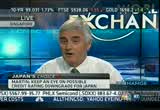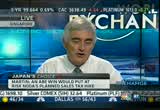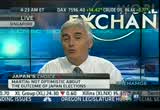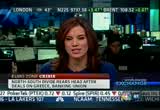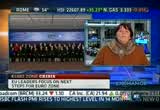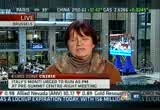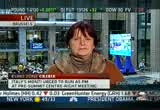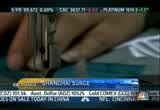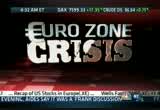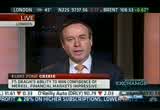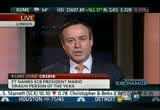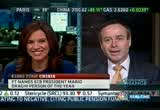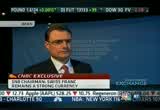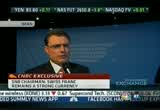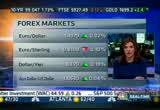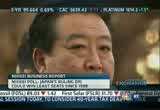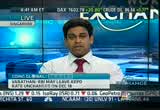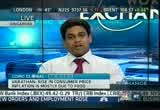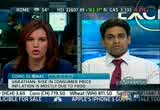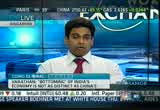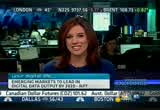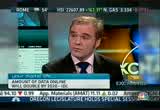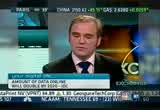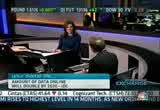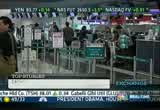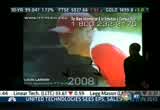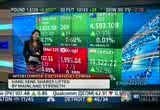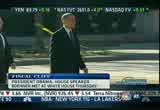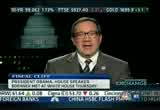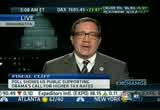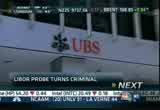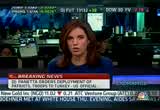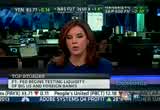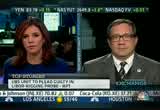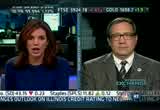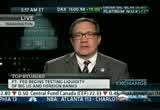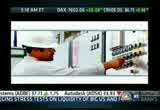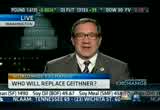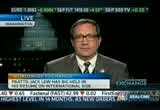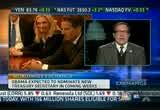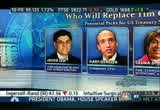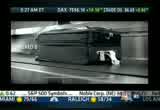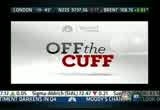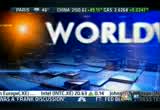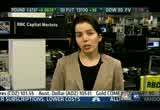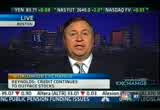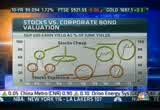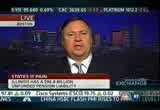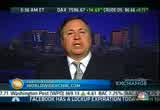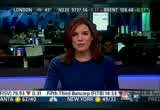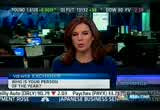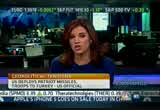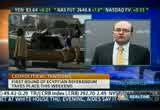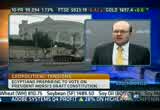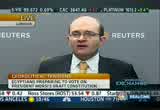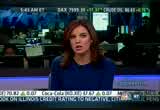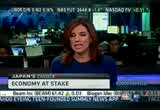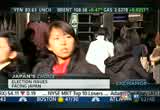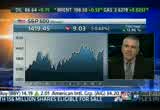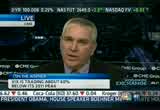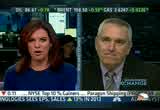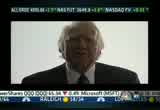tv Worldwide Exchange CNBC December 14, 2012 4:00am-6:00am EST
4:00 am
4:01 am
to keep the lid on growth. european markets get a lift from the latest european market data showing the private sector has expanded for the first time since april and signaling europe could avoid a recession in q4. and japan's business sentiment sours in the fourth quarter. this reading comes two days before a nationwide vote that suggests it will hand the ldp position a landslide win. we're going to give you all the latest results from the flash december data for the pmi for the eurozone that we're just getting out. the overall, the deposit is a touch stronger for the month of december. the details show the manufacturing weakened slightly and its services strengthened slightly. they are overall still in negative territory. and we're seeing the euro/dollar respond a little bit to the downside. down about 0.01% trying to fight
4:02 am
back into flat on the day. 130.75 is the level there. again, the services pmi is at 47.8. compared with the 47 that was expected. it's a five-month high. the manufacturing pmi, 46.1. the manufacturing all told, 46.3. that's a bit under the poll of 46.6. with more on the reaction to these figures, we have rob doddson with us. rob, welcome. it appears ta stronger services may be weaker on the manufacturing relative to expectations, at least, but the message broadly is still contraction. >> that's the case. we're seeing the pmi indexes track a bit higher over the last few months. so nothing spectacular there. but this does raise hopes that maybe we could see growth coming into the first quarter. the eu, banking -- things like
4:03 am
nap but, again, still down. >> not great news for france if we start to look at some of the indexes. there's a lot of focus on this economy. >> exactly. and the weakest spots, given that it's the second largest economy. now, we did see that return to growth for germany, which is a positive and will be a good gain forward. but say order box, very weak. demand, very weak. business confidence very weak and this is going to be hitting activity indicators going forward. >> even though the manufacturing side of it disappointed, the services was stronger. while services is a big part of the economy, it's where we're trying to see the rebalancing in the german economy happen. from that point of view, probably a rather encouraging development. >> it is interesting. it's also very exportwise. what we saw on these numbers was german exports falling sharply again.
4:04 am
and this is just signaling that global economic conditions, soft patch very weak, particularly for the region -- i'm sorry, within the eurozone itself. >> and it's consistent with the weakening global demand we're seeing out of japan and other areas this morning. but it's not necessarily -- if you look at the details of what this is telling us across the globe, frankly a point to deceleration in activities. >> and maybe the global economy will continue to expand. they will signal that china is coming back to a bit more growth in that sense. but, again, overall, what we're seeing is a lot of weakness in the eurozone economy. >> rob doddson will stay with us. one oasis this orange, the shanghai composite b, a burst of buying sent shares soaring. li sixuan is standing by with the details. it's a extraordinary number for today, 4%. >> another shanghai surprise
4:05 am
today. the xos quit broke open to search more than 4% to add a four-month high on heavy volumes. this is the index's strongest daily gain in more than three years, a combination of factors at play here. some ramping up of expectations ahead of the central economic meeting this weekend where leaders will set new growth targets. there's speculation of state-backed institutional buying and the better early pmi readings. the flash december gauge showed china's factory activity climbed to a four-month high. it's the fifth straight monthly gain with expansion and new orders to a 19-month high and stronger job signals, as well. on the market today, developers and infrastructure were among the top gainers on hopes for ba jing's top urban plan. shares in hong kong were noddest in the mainland, ending higher by about .7.%.
4:06 am
petrochina gained 1.3% in a canadian shale gas project. meanwhile, in japan, the down beat tenkan survey might have put more pressure on the markets next week. sharp shares gained almost 8% and has already chalked up more than 50% this month on short covering. elsewhere, a 2 1/2 month high, the aussie market ended flat around its 17-month high. back to you. >> okay. sixuan, thanks very much for that. rob doddson for market is still with us. rob, i just want to help us understand how we can, on the one hand, have this stronger china figure sending shanghai up better than 4% and meanwhile, the tenkan survey is pointing to weaker demand. are you seeing signals that are
4:07 am
consistent with that with slowing export growth, with slowly global demand? >> we have very much. one of the components to new export order components signal a slight dip in export orders. this is suggesting that what we saw in china this month is more domestic driven as opposed to being exports. again, it suggests that china is being hit by the global headwinds, as well. >> these are the december figures. what kind of growth rates do these point to? >> in terms of china, this is probably signaling a modest improvement on the 7.4% we saw in the nird quarter. for the eurozone, we're expecting 0.1% contraction in q3. the pmi signals this quarter, probably signaling a sharp cut. we're seeing some of the more
4:08 am
forward looking indicators for china and the eurozone still tracking higher. particularly in china, it's the share between orders and inventories, which suggests manufacturers may well start to restock in the third quarter. that will increase output for things such as in the eurozone we're seeing business confidence tick higher. nothing significant, but still, still tracking higher. possibly out to contraction and growth. again, very muted overall. >> we'll leave it there. rob doddson, thank you very much. now let's check in on markets this morning. the stoxx europe 600 just a little bit higher. 0.01% to the upside, roughly split between decliners and advancers this morning. and a mixed picture across the major bourses, as well. looking for a mixed picture after all the data we got today. for the most part, the ftse and xetra dax trying to eek out small gains.
4:09 am
a couple of names in particular to focus on, top movers today, alcatel lucent, look at that, up more than 9 the%. it was procured a $1.6 billion credit facility. akzo nobel is shedding it's north american paint business for $11 million. not sure that's sending the best signal about the strength of the u.s. market. fiat is down nearly 6% this morning on talks of raising capital there. any further news we get on that front, we will bring to you. quick check on the bond wall as we do that now. as you can see there, the uk gilt is telling offer a little bit. yield riding to 1.78%. whether it's the bund or even yields in spain are falling as prices rise a little bit. so there is light at the end of the tunnel according to our next
4:10 am
guest. he says the global economy is close to reaching its weakest point before recovery sets in. he's robert cohen, chief equity strategist. woke. >> good morning. >> we just heard rob doddson talking through some of these results. unfortunately, we saw some signs of weaker demand, especially global demand in these reports. but perhaps what is consistent with what you're saying, why is it your view that that is going to happen? >> sometimes you need to pull away. you move away from the fundamentals a little bit on the month to month improvements. if you look at 2013 as a whole, the big headwinds you've had in a number of years, fiscal austerity is largely the sarp in europe year on year. 2014, that comes up quite quickly. 2013 is largely going to be the final year of the crushing deleveraging if you like on the
4:11 am
european banks. so essentially the whole theme of the aurm is 2014 should credibly be the first recovery year we've been in years. >> 2013? >> 2014. >> you're looking way ahead. >> if you look at some of the negative news coming out now, european equities have been on quite a good run for the last few months. >> absolutely. the german market is one of the best asset classes across the world, up what, 20%, 30% this year? >> yes. it's quite bizarre. there are actually gains to be made and they've been quite painful. my main argument is i think you're going to get normalization in 2014 for the deleveraging side and from a lot of the headwinds. once you're trading equities, you're looking at at least 2014 from next summer onwards. >> they're going to start to sniff out that improvement. i want to focus on a couple of names that you single out.
4:12 am
if the macro concerns start to exceed, stock picking does become more important. in light of today's news were your bank calls, including ubs which you like for next year. still, after all the news overnight? >> yeah. what we do with our calls, because when you do a selection of favorite ideas, some of those will do quite well in certain scenarios and some won't. hence, you produce a basket. ubs is a solid restructuring story. we don't like a lot of restructuring stories for commerce bank or some of the weaker ones. but ubs has a credible story, the same side as that. i think the french banks do particularly well. and i think that soft core or periphery start in the likes of bnp paribas. you still have weakness, you still have the fiscal cliff which should work out well. but potentially, that's a binary moment where the market is up 10
4:13 am
or down 10. i think there's volatility in the first part of this year. >> it's not just a quarter of appear hour these days. what about some of the other sectors? i see here some consumer names and rio tinto. >> yeah. i think it's the imagine market consumer story is nothing new. that's been very popular for a number of years. a large chunk of this year, china slowed down dramatically in the second and third quarter. if you get normalization n, if you get a slide improvement year on year in 2014 in the u.s., a lot of these emerging market cycles have bottomed. you see the china numbers improve. the u.s. is down a little bit. so i think the emerging market consumer names will do particularly well again. >> and on the disclosure front, do we need to indicate whether you have a business relationship with any of these companies? >> no, not at all. >> okay.
4:14 am
robert quinn, thanks very much for your time. now stick around because straight ahead on today's show, we'll be live in brussels as europe's leaders gather for their latest summit and we'll look at what else, apart from the banking union, will be on the agenda. plus we speak to the editor of the "financial times." and find out why the paper picked draghi as their person of the year. who is going to be the next timothy geithner? president obama gets ready to unveil his next pick for treasury secretary. and voters head to the polls for their first vote in egypt's constitutional referendum. we'll take a look at the possible outcomes a little later in the program.
4:17 am
welcome back to the program. greek lawmakers have submitted a long awaited bill to curb taxation. this law is further towards complying to satisfy financial critters in receipt of aid. the move comes after eu leaders reached the deal to agree on ecb banking supervision rules for the block and bailout agreements for athens.
4:18 am
leaders are set to spar over who pays for what. sill veer ya has been braving brussels for us all week following the latest. silvia, it sounds like the old divide between north and south is still at play here. sylvia, are you with us? can you hear us? i think sylvia lost her sound there so we'll come back out to her in just a second. if we can forward on to some of the other news we're getting out of that meeting, mario monti made a surprise appearance that we'll talk about as soon as silvia comes back. in particular, let's shift to asia and head to key elections. think in the most recent manufa worsening,
4:19 am
meanwhile, opinion polls have been very consistent about which party is likely to become japan's next ruling party. kaori enjoji has more for this. >> japanese prime minister yoshi hikonoda is trying to keep his party in power just days before the election. it could pave the way for the return of the liberal democratic party of japan. >> japan is going to have another election due next year. and what abbe is perhaps going to do is to use the government machine as much as possible in order for the budget to be increased to sustain some of the public works because there is another critical juncture coming up because the japanese government is going to have to raise the tax rate for consumption tax. >> japanese economy is now in
4:20 am
recession. and this is the third time sips the leaning crisis. the budget deficit is now five times larger than it was in 2008. regardless of who wins on sunday, there is widespread expectation in the markets that the bank of japan will ease monetary policy further next week. at the same time, many market investors are hoping that if there is a new government in place, they will do a better job of convincing the central bank, the bank of japan, to embark on unlimited easing until inflation is stamped out. >> whether the boj would be able to decrease the currency through the monetary ease sg very much debatable. but i think it's possible if boj commits to 2% inflation goal and begin to -- the assets on this balance sheet. >> although the polls suggest the dpj losing in this election, the polls say that 40% of voters are undecided. many of them, though, are very
4:21 am
disappointed the dpj failed to deliver on can of the processes they made back in 2009. this comes, of course, at a critical time in terms of national security with a very punishing territorial ongoing dispute with china, so a lot is at stake in this national vote on sunday, which is the first since the march disaster necessary 2011. that's the late freft tokyo. back to you. >> joining us now for more is richard martin. richard, what i find interesting about your notes here is that i at a time when everybody is talking about abbe riding to japan's rescue, you're saying not so fast. >> yes. there's a battle on policy settings in japan. two sides. on one side, you've got those who want to have a bit more austerity. they don't want to print too much money and fund a larger debt. that's the position of the current government. on the other side, you have abbe, and he's out there
4:22 am
promising to reverse policy 18 0 degrees, to spend more money. and you have to ask where are they going to get that money and to put pressure on the bank of japan for quantitative easing. it's a gamble. when they do this, when they start spending more public money, you can bet that the sovereign ratings firms, standard & poors, moody's will look at the abbee government next year and look at a possible downgrade. it's a gamble abbe will take. it's accelerating, a big mountain of debt that they've got and one side says we should be paying it down and the other said, forget that, we've got to get the economy moving. >> richard, what's the option here? we've seen what hesitant does which does nothing for the japanese economy and does nothing to ultimately weak b the yen. absolutely, the risks that you're citing are only going to
4:23 am
grow with this type of aggressive policy, but i'm not sure that the alternative is much better. >> yeah. well, you're right. in a sense, the clock is ticking. what do we mean by that? it removes the time for just sitting around doing not much in government. when i say the clock is ticking, look at the trade balancing for japan. 30 years in surplus, the yen is too high when it's up at 80 to the dollar. what happens is the korean competitors, whether they're electronic goods, ships or particularly automotive can kill their japanese competitors. anytime the won gets weaker than 10 won to a yen it's a problem. they have to move soon because the trade balance would l work against them next year. it was surprising at the end of
4:24 am
november to see the ceo of toyota say this concept of japan as a market export is gone. >> even though this risk that you're talking about is out there, this seems to be the aggression japan has to show right now. >> absolutely. abe is winning some people over to his side. we saw the stock markets jump when i was outlining his policies. generally, the market is thinking favorably. but don't forget, you know, there is the other side of the coin. he's risking a sovereign ratings downgrade now. how big a risk is that for japan? you look at that mountain of debt, 220% of gdp growth. the thing is, it's always largely held in japan, 95%, 96%
4:25 am
held in japan mostly by banks. and it's a safe gapeble. they're not going to do anything with it. they will keep buying government bonds as instructed to. >> richard martin with iaa asia. do you want that last word, richard? >> yeah. it's a gamble worth taking and he'll do it. >> thank you so much for your time. coming up this weekend in a transformative moment for japan. speaking of transformative moments, did we get any at the brussels summit this week or is the north and south divide still rearing its head? silvia wadhwa is back with us. silvia, you looked as though you were ringing your hands earlier. what are you seeing in terms of these meetings? >> the homework was done in terms of the urgent work. that was basically the finance minister's work. now we're talking about fiscal compact, more harmonization, more europe on the road to
4:26 am
integration and then we have pretty much the old dividing lines. as you just said, we have the north that supposedly has to write the paychecks right now and the south that maybe is at the receiving end of some of the paychecks. the north would say, we have to keep the pressure on on the reform process. in order to do that, we can't agree to a mutualzation of debt. we can only take this step by step to keep the pressure on. and the south is saying, come on, give us a break. put some kind of thumbs up for a reform reward process as it were. at the end of the day they decided, hey, it's christmas, let's have some miles and christmas carols and defer everything to sometime next year. we're going to have the next half year to hopefully work out more of the road map to work out motor of the european integration. it seems the eu works earn pressure and when the pressure is off, we kind of take it easier. so that's why maybe the
4:27 am
skepticism of the madam merkel and the line is justified. >> and we thought it was an unusual move for mario monti to show up with his political throw, berlusconi and the german chancellor merkel were present. a lot of expressions of support for a monti candidacy here. what does this imply? what are people making of this? >> it's one of these things. in all honesty, we thought that the era of berlusconi had been done and dusted and we had opened a new page. but, okay, sometimes there are some comeback kids and berlusconi could be one of them. he did say that if monti would stand, he would resolve his claim to anything, but he wanted to prevent a shift to the left in italy. that's something angela merkel
4:28 am
could support. although she might have to face her own transition to the left as we face elections in september. it's hoped mario monti would stand again and would stay in place because clearly that was the sort of work in progress that worked well. down with the euro and italy has to walk its own way. that is not something that we would like to hear in the eu eurozone or in berlin. >> silvia, thank you so much for your time. now, a weak ahead of the person of the year, the winner, north korean leader kim jong un. the magazine didn't admit that various online campaigns were at work to influence the vote. not necessarily a legitimate tell on who readers would like
4:29 am
to see as person of the year. so we're going to cast our own poll on "worldwide exchange." who is your pick for person of the year? e-mails us here, tweet us. i think ross westgate gets my nod. we'll see if maybe he comes out ahead in our unofficial reader poll. staying on that topic, the financial times has named its person of the year. we'll tell you who it is and talk to the newspaper's editor when we come back. can i help you? i heard you guys can ship ground for less than the ups store. that's right. i've learned the only way to get a holiday deal is to camp out. you know we've been open all night. is this a trick to get my spot? [ male announcer ] break from the holiday stress. save on ground shi fedex o.
4:32 am
you're watching "worldwide exchange." shanghai shares see their biggest gain in more than three years. flash pmi data suggests domestic demand is strong enough to boost growth. mixed signals from flash pmi data in the eurozone, business activity expands for the first time sips april, but we see contraction for the 11th consecutive month. and japan's reading comes two days before a nationwide vote that polls suggest will hand the lpd opposition a landslide win.
4:33 am
the financial times has named ecb president margo draghi as its person of the year. they credit him with giving financial credit for hopes that the ecb would do whatever it takes to solve the 3-year-old crisis. will draghi go down in history as the man who saved the euro? joining us now, lionell barber. thank you for joining us. are you trying to urk the bundes bond with this pick? >> no, not at all. he has charted his course very, very carefully. it's important to recognize that he has won the confidence of the chancellor angela merkel who is of course the other chief protagonist in the euro drama. so, of course, there is a very unusual public campaign being waged by the bundes banks in
4:34 am
germany and there's a lot of hostility there. but they don't speak for the whole of the german public. >> i wonder, too, who else is on the short list when it comes to making the decision. who else was at the top of the list in terms of person of the year? >> let me just point out that we did not conduct an online poll. we may look at that next year. this was decided in conclave by senior editors at the financial times. angela merkel was, indeed, the other chief alternative. she has played a very important part in the year that may go down as the year that marked the moment that the euro was saved, rescued. they're not on out of the woods completely, but i think mrs. miracle understood that the costs of a break-up, notably let by a greece exit were too high, higher than keeping greece in. >> and who were some of the past
4:35 am
winners? what in your point of view is the most important criteria for picking person of the year? what is this supposed to represent? >> it's an important contribution to innovation. we've had receive jobs, for example, as person of the year. we earlier, five years ago, we had picked shawn claude trichet, the then president of the european central bank because he led the central bank response in 2001. so i think it's someone who has made a decisive, positive contribution to economic policy, public policy and that is probably why we wouldn't choose the north korean lead, who just let up a north korean missile this week. >> are there any regrets over choosing trichet now? >> i don't think so. he played an important role. we think mr. draghi has been
4:36 am
somewhat bolder in his approach, notably through the money transactions which are designed to intervene in the bond market to reduce spreads where, in effect, speculators are betting on a break up of the eurozone, which is perhaps unnaturally raising borrowing costs for those countries. but they're actually taking very difficult measures structural economic reform such as spain and italy. >> lionel, last week before i let you go, how would you feel about working for michael plumeberg? >> well, i don't know whether that's actually on the agenda. mr. bloomberg is currently mayor of new york city and doing a good job. >> and doing a quite capable job. lionel barber is the editor of the financial times. we thank you for your time this morning. now let's take a quick look
4:37 am
at the swiss franc. why? this is one place in particular in an exclusive interview with cnbc, the chairman says they could employ negative -- to swees the swiss franc low. >> the swiss franc remain aes strong currency and we expect it to weaken over time which is economically the right thing that should hab. >> the fed has said it will now have numerical targets for its monetary policy. are you considering similar targets for as to when you would change your stand on the minimum exchange rate? >> every country obviously has a little different monetary policy. it is crucial to maintain for the time being. that's the right decision for
4:38 am
this area. >> the swiss frank is notably weak weakened. given that these measures have seemed to work, would you can happen consider similar measures? >> we do not exclude any measures that are necessary at one time. negative interest rates are something that we could implement one day or the other. >> let's talk about the outlook for the economy. you're not as upbeat about fourth quarter growth and growth next year. why? ? >> well, we have very volatile quarterly gdp numbers. in order to understand the underlying trend, we have to look at several quarters. for switzerland for 2012, we have 11% growth. it is relatively low. even for 2013, we expect only 1% to 1.5% groekt. >> so what are the biggest chals for the swiss economy at this
4:39 am
point? >> it's still the international environment and the strong swiss franc. the combination makes it very, very difficult for exporters. we do not have a very good environment to deal with the demand for exports and the swiss franc is still very, very high which makes the life for those exporters very, very difficult. >> in your last financial stability record in june, you heavily criticized credit suisse for the lack of capitalization. how much more will have to be done by chris swredit suisse? >> the capital is much improved. i think it's important that ubs and credit suisse continue to build up the capital until the situation is where they should be next year. >> carolin roth talking with the
4:40 am
seb. let's take a look at european markets this morning. across the board, some figures disappointed. the ftse 100 down about . 03. xetra dax, ibex are a little higher on the morning so far. the euro/dollar is barely high he, 1.3079 is the level there. you can take a look at the dollar/yen, as well. that's adding .2% today ahead of the elections in japan which could deliver abe a big win for the opposition party. and a new nikkei poll is pointing to a clear win for the opposition. fashiko joins us now live from tokyo. >> hi, kelly. the latest survey suggests that the lpd party is heading for a landside. its coalition party could also
4:41 am
win as many as 300 seats in the 480 seats being contested. they may even get a super majority that would allow them to override the upper house opposition to their legislative agenda. notice the democratic party of japan is expected to lose its major seats. that would be the lowest since that party was formed in 1998. the smaller parties are also struggling. but many voters say they haven't made up their minds so there still could be room for surprise in the final outcome. this survey was conducted tuesday through thursday in battleground districts from a sample of 26,000. back to you, kelly. >> fushiko, thanks very much for that. meanwhile, india may be getting a grip on inflation. its main gauge on prices slipped in november to its lowest level in ten months thanks to a drop
4:42 am
in manufacturing. india's wholesale price index was less than expected, up 3.4% on the year. still most say the cooling won't be enough to steer the central bank towards a rate cut. for more on what we might expect, we're joined now from vishno. wa do you expect the rbi to do next week. >> i think they will communicate that they're quite heartened and they will point to the down side risk for growth. overall, policy will continue to have a slight easing balance. they're probably going to hold the rate at 8%. nonetheless, they would cut crr at 25 basis points if not 50 because liquidity remains pretty tight. they're saying that policy transmission is weak, so earlier rate cuts this year haven't really seemed through yet and
4:43 am
they're trying to fix that with the crr cuts. but in the meantime, they want to enter inflation expectations and for that reason they'll continue to hold the rate at 8%. >> talk about the figures we got today. consumer prices still up in double digits. >> cpi and ppi have moved in opposite directions. the key seems to be that the food price inflation effect is being factored into the ppi a bit later. nonetheless, i think food inflation will become a bigger component of the ppi. it will be a driver of the ppi in the next two or three months perhaps. it's one rick we need to take note of. the ppi will probably remain pretty sticky. the main take away, really, is
4:44 am
that knot nonmanufacturing component of the ppi, which is the preferred for demand inflation, that has come below 5%. so on that matrix alone, it's suggested that historically they can put another basis point from the rate mainly due to signaling the fact that they want to maintain it for now. but we see these cutting rates from mid 2013 to about 7.5%. >> i was just going to ask you about 2013 and what the numbers mean for india. india has an issue with supply for its economy. what are your concerns as we look into next year? >> if we had to prioritize, i think my main concern is how the political scene develops. we've had some small victories so far. the government has managed to push through the fdi with a majority vote in the lower house. but this needs to be kept us
4:45 am
because one of the main impediments to india's recover right now is the lack of investments driving growth. meanwhile, i think good domestic consumption has taken a hit due to high inflation, pretty tight monetary conditions as well as the fact that overall growth conditions are weakening. and so the consumer mood is there is not as good as it could be. external factors are pretty weak, as well. growing concerns will continue to dominate. >> and expecting perhaps a rate cut by the middle of next year over in india. he's a market economist at mizuho corporate bank. there's a lot happening in asia just over the weekend. the country will peck its seventh prime minister since 2006.
4:46 am
china's top leader res expected to meet saturday and sunday and monday we'll finally gets china's foreign direct investment numbers for december. lots to watch and it will be interesting to keep appear eye on how traders sxret express views over the weekend. straight ahead on the show, a round about in east london is being hailed as europe's answer to silicone valley. but should california tech giants be shaking in their hoodies? stay tuned.
4:49 am
welcome back to the program. the financial times picked mario draghi as its financial person for the year. earlier in the program, we asked you who would be your pick. bruce tweeted in to say silvia wadhwa, she's my favorite. silvia gets our vote, too. get in touch with us by e-mail, worldwide@cnbc.com, tweet us or tweet ross even though he's not here. in fact, i encourage that. east london has been hailed
4:50 am
to europe's answer to silicone valley. can it really compete? and what's in it for investors? tom mckenzie reports. >> in just a few years, london's tech city has grown from a handful of companies to a buzzing cluster of close to 5,000 businesses. it's spawned favorite start ups like moshi monsters and wonga.com. google and facebook have opened offices here and it's a major part of the uk government's growth strategy. british prime minister david cameron recently announced a 50 million pound cash injection for the tech hub. >> this will provide entrepreneurs and staff hubs with the spaces that they need. it is a 21st century civics space and i think will be a global landmark for east london. there's no denying the buzz.
4:51 am
the question is, is there buzz available to help these entrepreneurs get to the next level and can investors turn a profit? long-term players say the rewards are well worth the risks. >> the reality now is these are real companies doing 50, 100, in some cases half a billion or more in revenue. they are still growing at exceptionally high rates of growth and theerg either capable of profitability. >> money start up transferwise has received more than $1.3 million of investment. and its ceo is ready to put the money to work. >> we're growing at a rate of 20% or 30% a month. we're hiring people for every position of the company. we're about 20 people now. we'll be about three times this size by end of next year. we're hoping to reach around a billion in 2014. >> so can this kind of growth
4:52 am
trickle through to the wider economy? >> right now we're in a little bit of a middle stage where we're throwing a lot of spaghetti on the wall, seeing what works. but i think the companies will emerge out of this and hopefully, you know, we'll create the next wave in the economy. >> that's the goal everyone here at tech city is shooting for. >> now emerging markets will outpace london by 2020. that's according to a new poll. what else should we expect by 2020? joining us now is chris. welcome. >> thank you. >> let's talk first of all about the geographical distribution of basically big data. who is generating it and where is it sitting? and what does that mean? >> so when we sponsored the report first back in 2007, 20%
4:53 am
of -- was built in the developed world. we reckon by 2020, 68% of that data will be reduced out of developing countries such as china and brazil. so it's a massive shift. >> not surprising because we're talking about just the sheer number of people coming in and the demand for data that that's generating. >> it's not only people, but it's the age of the people. one of the big drivers of this is social media and that's mainly driven by people under the age of 2537 also with telephones and smartphones in the mountain, that will generate the availability. >> how much data are we talking about? when we look around the tube or on the bus and seeing everyone on their mobile phones, what is that adding up to? >> in 2020, it will be 40 zeta bytes. to put that in perspective for you, if you added up every grain
4:54 am
of sand on every beach across the globe, that would come to 700 quinn trillion about it of information. 40 zeta bytes is 50 times that amount. so it's just phenomenal. >> 50 times the amount of sand on the planet? >> 50 times. >> and where is it all being stored? i wonder if we're not going to turn into a world of server farms and data units. >> certainly not all of it is stored. 20% of what could be protected is protected at the moment. >> which will become another industry in itself.
4:55 am
>> at the moment, we're analyzing 1% of that data. but to analyze it better so we can predict something is going to happen so you can allocate your resources better, that becomes a fascinating exploration. >> it's like the movie "minority report." >> it's massive opportunity. with the mapping of the genome, which is going to create massive amounts of data, if i can correlate that data with facts about you and other socioeconomic facts, i can get into doing personalized medicine. how can i design a drug that is personal to you and your cancer? that is a phenomenal thing because it allows you to be treated before you can go to
4:56 am
hospital. that can only be a good thing. there's a protection side of it that comes out which is we have to get our privacy laws right and the companies, countries and industry that do that first i think will get the major benefit. >> it will make those of us with over full inboxes maybe think twice about the impact that's having on the world. chris, thanks so much for your time. >> thank you. >> fascinating. zetabytes. that's a new one for you. a new block of facebook shares could hit the markets today. ceo mark zuckerberg is not included in this group and he says he won't sell any more shares until in many next september. facebook's final lockup period will end next may on the one-year anniversary of the ipo. shares are up 40%. yesterday, adding better than 2% in trade. and one of the most famous
4:57 am
musical instruments in movie history is up for auction today. this stand up piano was used in the oscar winning 1942 film "casablanca." unlike a traditional piano, this one only on has 358 keys. sam plays "as time goes by." the piano was first sold in 1988 and it's expected to fetch anywhere from $800,000 to $1.2 million. >> and so much for service with a smile. the cathay pacific's union say they could soon hold off to pags out food, booze. the union says smiling would give a false impression of how employees are treated. still ahead on the program,
4:58 am
5:00 am
5:01 am
and avoid the fiscal cliff. shanghai gains are highest in more than three years. flash data suggests domestic demand is strong enough to improve growth. japan's business sentiment sours for the third quarter. this comes just days before an election that polls suggest will hand the ldp opposition a landslide win. first, we have a couple of data points to bring you. the one we're getting right now on employment across the eurozone or lack thereof, it is said that eurozone employment totaled $146 million in the third quarter and that was, in fact, the lowest since the first quarter of 2006. so a near six-year low there in terms of total employment across the eurozone. it was down .2% quarter on
5:02 am
quarter. i believe -- i can't quite tell from the copy whether it was up or down. now turning to the cpi, a weaker set of figures there, as well. consistent with what was expected, a .2 drop on the month, up .2% on the year. the core was down .2% on the month and 1.4% on the year. so, again, a weakening in the employment figures in the third quarter and a soft read on cpi there, too. well, it was a mixed picture emerging from the eurozone for the latest pmi figures. germany has managed to pull itself out from a low in december with the go to composite index falling for the first time in april led by the services sector. yet that wasn't enough to lift the whole of the eurozone which remains firmly in contraction minority 11th month running. in china, it's going relatively strong. flash manufacturing picking up against in december for its fifth straight monthly gain.
5:03 am
li sixuan is standing by with the market reaction to that which included a jump in the shanghai deposit. >> we call that another shanghai surprise today. it surged to add a four-month high on heavy volumes. this is the index's daily gain here. some revving up of expectations ahead of the central economic meeting this weekend where leaders will set a new tone for next year's policy direction. there's speculation of state backed institutional buying and a better early pmi reading from hsbc. that showed china's factory activity climbed to a 14-month high. it's the fifth straight monthly gain with new orders to a 19-month high and stronger job snaps, as well. on the markets, infrastructure placed the top gainers. hope for beijing's urban growth
5:04 am
plan. financials soared on cheap valuations. shares in hong kong got a modest lift, ending higher by .7%. petrochina ended 1.3% higher. in japan's, the tankan pure say might have put more pressure on the boj to raise rates next week. sharp shares gained nearly 8% today and it has chalked up a more than 50% rise on short covering. >> the aussie market ended flat around its 17-month high. the index sensex is higher by .5%. back to you. >> thank you for that. were seeing the dow poised to open higher. similar gains to the nasdaq and s&p 500, which have been rallying this weeks, but not by great leaps and bounds.
5:05 am
the cnbc ftse 300 is lower by 0.2%. european bourses are mixed. we are seeing the mib and the ibex in italy gaining on the day. still adding about .1%. the xetra dax is higher by .3%. the ftse is fractionally lower. we can look at some of the top stocks moving today. alcatel lucent in focus. 10% now for alcatel lucent, which has completed a round of fund-raising. akzonobel is looking to increase its pain division. shares in that company higher by 6 of%. fiat, down nearly 4% this morning. a quick check of the bond curve and we're seeing for the motor part an attitude that is consistent with spain and italy rallying, yields falling to under 4.6% and under 5.4%
5:06 am
respectively. over here in germany, the bund also benefiting. again, not the clearest picture of risk on and risk off. in fact, that may turn out to be one of the themes for 2013. finally, a quick look at the euro/dollar. 130.4 is the level there. the dollar/yen, adding another .2% to 83.80 this morning. now, president obama and house speaker john boehner met at the white house last evening. aids say the men had a frank discussion. no specific details were released. this meeting came after a day of frustration in washington as both sides criticized each other for lack of progress. >> republicans want to solve this problem by getting the spending line down. the president wants to pretend the spending isn't a problem. that's why we don't have an agreement. >> speaker boehner can't ignore
5:07 am
the american people forever. at some point, reality should set in. the only question is how much financial stress middle class families and our entire economy will have to endure during this process. >> well, the clock is ticking. so is a resolution before the end of the year likely? let's of the pose that question to tony fratto. and a cnbc contributor. tony, good morning. are we actually going to get a deal? >> morning, kelly. boy, before the end of the year, i think that was your standard. i think it's getting to be more and more unlikely, kelly. i think when you see the kind of language and -- but actual language and body language that we saw yesterday, it looks farther away. but, look, i've long felt that this was a deal that could only happen after the new year. i still feel that way. i think you get the sense now that what both sides are trying
5:08 am
to do is to create the messaging so that no one gets blamed for going into january. but i really think that's where we have to go. when they say things like, frank exchange and lines of communication remain open, that's euphemism for we're not getting anywhere. >> absolutely. and we're seeing investors weather on equity, turning cautious on the outlook for the first quarter saying that, you know, the uncertainty is generated by us going over this cliff is one reason to stay on the sidelines. what would be the practical implications? again, we're approaching the debt ceiling. >> it's true. and i think the debt ceiling is a real issue that we also have to deal with and think about for where more of the decision making can be made is really around the debt ceiling. and then even into march, if people don't want to think that far out, but really into march when we get to the enof the continuing resolution for spending. look, i know i'm in the minority on this.
5:09 am
i do not see, you know, very big market reaction into january if we do not go -- if we get over the cliff on spending cuts because i think in that situation you'll have both sides, you know, telling the market that we're going to continue to work on this, we're going to continue to deal with it. i think both sides are in a much better position on revenues, on tax rates to deal and to give-and-take one it's de facto and not per speculative. if we talk about the kind of deal speaker boehner might have to bring to the floor, for those who believe we can get a deal, you're talking about rate hikes and a pocket full of promises and a pocket full of promises isn't going to pass the house. >> tony, you say it will be easier next year. but is it the point that it will be easier for the gop perhaps to come to some sort of deal turn around and say right, we've
5:10 am
lowered tax rates or are there constituents going to be too wise for that? >> well, i think their constituents aren't going to be happy if they try to make that deal and only on the top two rates. but i think you're going to have a situation where even the administration is going to have to deal on all rates across the board. the president made a promise, also. he didn't want rates to go up on middle class families. i've argued in a post on krn.com that we can go over into the clinton tax rates and be in a better position to do things like tax reform. so it's not all bad. we did live with the clinton tax rates for eight years. it's not like the tax rates alone should be catastrophic. >> says the pretty secretary of president bush. we'll take that, tony, as a sign
5:11 am
of prolg here. tony will be right back after this rate. november cpi, that report out at 8:30 p.m. the core up .2%. at 9:00, the december market flash pmi, 50 minutes after that it's the industrial tirgs. we'll bring you all the latest on the libor case when we come back. i need you. i feel so alone. but you're not alone. i knew you'd come. like i could stay away. you know i can't do this without you. you'll never have to. you're always there for me. shh! i'll get you a rental car. i could also use an umbrella. fall in love with progressive's claims service.
5:12 am
5:14 am
welcome back to the program to the bit of news we're getting out of the u.s. defense secretary panetta has order today deployment of troops and patriot missiles to turkey. this, of course, part of the u.s. trying to handle the syrian situation, syrian/turkey sharing a border there which turkey has expressed concern about as there have been come barredments reaching turkey and it is concerned about the refugee situation and the impact on their country. so this morning, just getting news that leon panetta has order today deployment of 400 personnel to turkey and signed the order to send the patriot missiles to that border.
5:15 am
obama and boehner tried to jump start stalled budget talks as they meet face-to-face at the white house. shanghai shares see their biggest daily gain in more than thee years ahead of a an economic plan ahead of 2013. and business sentiment showers in the fourth quarter just days before japan's election. now, the federal reserve has reportedly begun stress tests of the liquidity of some of the biggest foreign banks. the financial sometimes reports the tests are intended to guide regulatores and results won't be made public. there are no pass or fail rates, but the banks could push banks to adjust their funding. and the financial stability oversight council met thursday afternoon to discuss whether to impose more oversight on money market funds. this comes after new rules on
5:16 am
the 2.6 trillion industry. the fsoc is chaired by treasury secretary tim geithner and includes the heads of the financial fdic. ubs is set to plead guilty with charges into libor manipulation. tony fratto is still with us. criminal charges, tony? >> look, it is serious, but, you know, the whole libor issue was a serious issue. and i think what we need to do is see where we can get banks in a place actually where they can feel comfortable about reporting on inside interest rates in the future and getting this system right. b but, you know, criminal charges are very, very rare.
5:17 am
i think it shows they're taking the issue very carefully across a range of issues. global banks are dealing with a lot of interests across borders and -- but i think we're getting them to a place where they can deal with it in ways that governments are comfortable. >> tony, just on this news about the stress tests, the fed is conducting about the examination of money market funds. we have a lot of corporate cash sitting in money funds that next year at the end of this year may be added to if, in fact, the bank deposit goes away for funds of more than 250,000. so a lot of regulatory cross currents and what in your view is going to be the most significant impact of these? >> look, i think the stress tests are really important. across the board, we would love to see, you know, some of the other major economies do stress testing as i think astringently as the united states is doing. i think for the fed and treasury doing a credible job on stress
5:18 am
tests. the questions of liquidity funding for banks are critical. we talk about capital a lot. everybody has views on capital and quality of capital. but liquidity provisioning and how we do that in a global economy that really needs, you know, a lot of overnight liquidity -- not even about crisis liquidity. but how they function overnight is really important for the functioning of a really complex global economy. so we want to see them get it right and not make that inefficient for both banks and the firms that rely on bank funding and we have to do it safely. >> absolutely, a critical issue. in fact, the european central bank will give a read on its only conditions today. tony, stick around. the next u.s. trernry secretary could inherent the next fiscal
5:19 am
cliff mess. we ask which man or woman is up to the job? we'll be right back. we have big. one is for a clean, domestic energy future that puts us in control. our abundant natural gas is already saving us money, producing cleaner electricity, putting us to work here in america and supporting wind and solar. though all energy development comes with some risk, we're committed to safely and responsibly producing natural gas. it's not a dream. america's natural gas... putting us in control of our energy future, now.
5:22 am
appoint a new treasury secretary. and speculation is rife with who might land the job. the front-runner seems to be jacob or rather jack lew. he's the former white house chief of stan staff and budget director. others are pulling for gary gensler. as for a female candidate, one name being floated is laura d. tyson, former economic adviser to president clinton. and billionaire warren buffett recently called for jpmorgan's ce oo jamie dimon to take the post. in an interview earlier this week, dimon shot down that speculation. >> i'm not suited. i don't believe i'm suited to it. i don't believe a ceo from wall street can be confirmed. .it's not what i want to do. i love my company. we do a lot avenue great stuff. i think it's perfectly suited to that.
5:23 am
jamie did run through support behind front-runner jack lew and here is what he had to do. >> i think the world of jack rew. it's the one job and it's the lineup. it's not just the one job. so -- but jack lew is a very qualified, capable individual who has been in the private sector, too. >> or will it be tony fratto? tony, we wonder who is on the short list in your point of view. >> i've worked for three of them and been around tim geithner a lot and watched the work he's done. look, i think jam jack lew, really is the front-runner for this. i think the white house is very comfortable with him. i think they like the roll that he can play in a lot of the domestic battles that they're going to have this year, especially budget matters which he is authoritative on and has been an important player on. the big hole in jack lew's
5:24 am
resume for this job is on the international side, kelly. not a lot of people really pay -- well, your audience on "worldwide exchange" pays attention to the international roll of the treasury second. but not back here. they forget all the world in trade and investment in china that a treasury secretary has to be involved in. jack lew is missing that. he hasn't done much or anything at all on the international side. so there's a little bit of an unknown player there. >> and tony, that would seem to be a pretty much vulnerability. we're reminded on a daily basis how much there needs to be in connection with the rest of the world. >> laura tyson is well known in international circles. there's some people outside of the list you have there. jamie dimon says he's ill suited
5:25 am
for the job. i think jamie dimon is perfectly suited for the job, just not right now and he's well known internationally. larry fink at blackrock, he does a lot of business around the world, is terrific. rayell brainerd, she will be a long shot for this job, but these really strong on the international economic work. people think very, very highly of her. some speculation, kelly, this is really interesting. if jack lew is named treasury secretary and there's an understanding that he's weak on the international side, there's speculation that layelle would move to a slightly higher position at treasury to fill some of the gap there. >> it's interesting and i wonder, too, practically speaking what a jack lew would look like relative to, say, a geithner. >> boy, i think it a little a little bit better work on the hill than tim geithner had.
5:26 am
tim had a rough time, woulding with members of congress on the hill. that's not knock on tim. it's a difficult place to maneuver. these guys in the capital behind me, they have their way of doing business. .it's not a world that tim came from. tim came from staff at treasury and working in different circles. but jack lew is very, very comfortable with that space. he knows a lot of them. they know him very well. >> will he go over well with the public? we've seen, for example, susan rice withdrawing her own potential name for the running for secretary of state. >> right that was, i think, expected, but still big news here in washington when susan rice withdrew her consideration. the communication role of -- i think of the big three defense
5:27 am
secretaries, cabinet, treasury and state, tresh tri is the most important for domestic economic policy, obviously. it's also the one that persons are going to listen to and pay attention to more often than rice. but, you know, jack can do that. there are others out there, i think, who are also really talented. it's not a short bench for treasury secretary. i think it's a long bench. >> tony fratto. thanks very much for joining us this morning. >> thanks, shelly. straight ahead, a weak before "time" magazine's most important person of the year, readers have made their choice and they have chosen north korean leader kim jong un. the magazine noted that various online campaigns had influenced the vote. so not necessarily legitimate, but we want to know what would be your person of the year? join us here on "worldwide exchange" at cnbc on dwiter.
5:28 am
5:31 am
meet face-to-face at the white house. shanghai shares post their biggest daily gain in more than three years ago china gets ready to start its new plan. dmvt domestic demand is strong enough to boost growth. japan's business sentiment sours in the fourth quarter. this reading comes just two days before a nationwide vote. polls suggest they would hand the opposition with a landslide win. >> announcer: you're watching "worldwide exchange," bringing us business news from around the globe. as we indicated, mixed data overnight with some stronger reads out of rash ya and europe. but also some weaker ones. these cross currents where you have stronger rebalance, can i china strengthening and a decline in france left futures pretty much pointed higher in the u.s. the dow is poised about 39 points higher in the open.
5:32 am
the cnbc ftse global 300 gives you a rough idea of what we've been seeing. we're roughly flat, down .03% at this point. the ftse is mixed. so, too, is the cac 40 in paris. is xetra dax has added .2%. the risk on/risk off is certainly a correlation story. here is what our guests have been telling us all morning. >> i do quite like the aussie. we favor it against the qe because of the relative raid dynamics. things have swung too far in the kiwi's favor. if we are seeing a bit of a pick up in appetite sentiment, the aussie is one of those currencies that does very well on the back of that. naturally, we expect the equity markets to perform well in the short-term on a bit of a sugar high from weakening yen.
5:33 am
>> the main traders, anyway, are going to be risk on and filt because off anywhere because of a long-term environment. going short is not necessarily going off, but would probably be a good trade. >> a river of cash is flowing into the corporate bond market. issuers have rushed in ahead of the end of the year. this week alone, 21 deals have priced in the high yield market alone. and overall, 2012 has been the biggest year on record in terms of volume with nearly $322 billion worth of issuance. well, joining us now for more is brian reynolds, chief market strategist at rosenblatt securities. brian, is 2013 going to be even bigger than 2012?
5:34 am
>> it has the potential to. our nation's pension funds are facing a national deficit. they haven't funded their past promises. so they're raising the contributions that cities and towns have to contribute to them. there's the potential for even more cash to flow into the credit markets next year. >> talk a little bit about this structure of this demand. because pension funds, it sounds like region with switching more .more into credit essentially as they have to try to make returns wherever they can. >> it's kind of crazy because yields are at historic lows. most pension funds need to make 7.5% and market yields are nowhere close to that. over the course of this cycle, they will probably be unsuccessful at meeting their goals and at the end of the day, credit cycles always end and they always end badly. but that's probably not going to happen for years to come because there's so much more coming into the pejz function and we're
5:35 am
probably only halfway through this. >> that's remarkable. i wonder what the size of the cash pile we may be talking about, this wall of money going into credit markets. >> well, the size of the gap, paul volcker estimated the size of the gap at $ trillion. the investable u.s. corporate bond market is only $5 trillion. so you have a tremendous demand for credit and a limited supply of it. as much debt as there is, demand is outstripping it dramatically. we're doing so more expensely in this credit boom. >> and here is one example of where demand is coming from. moody's is lowering its outlook from illinois's credit rating to negative citing continuing problems with the state anticipate ability to fund its public pensions. illinois is being crushed by a
5:36 am
unfunded liability and lawmaker res pushing to get various reforms passed month. moody's says that attack can be canceled. illinois being one case where this need is getting more and more pressing. >> the long-term ratings are under pressure because if you take a long-term perspective, it's not likely they're going to be able to make their pension goals over the course of, say, the next 15 years. but in the interim, while they're raising the fees, that produces another two to five years of increased flows into the credit market. and the result is that you're seeing a wave of companies being able to take advantage of this. for example, chartered communications, a company that was bankrupt a few areas ago, they issued a ten-year bond this week at a little more of 500. if you're a pension fund, there's no way you can get your 7.5% for investing in a junky
5:37 am
company like that. you increase going have to turn to the financed market and will he haver up the way they did for the '90s and we have to begin that process of levering up. >> and i want to ask about the hurdle of the fiscal cliff. if this hits at the beginning of next year, that is, if we go over it, is that enough to trip up the rally that we're seeing in the near term? >> if we go over the fiscal cliff, it will probably knock stocks down again, similar to the way that the u.s. downgrade did in the summer of 2011. but the credit market ended up getting better because of that. and if we go off the fiscal cliff early next year, the credit market is going to improve because there's going to be a shortage of treasuries. with taxes going up, with spending going down, the deficit will shrink. they won't print treasuries the
5:38 am
way they used to. that means treasury yields will decline sharply. that will force these pensions even more into corporate bonds. while we can create a short-term down draft in stocks, it's like going off the fiscal cliff with a bungee cord attached. >> borrowing costs even lower than what we're seeing now. you heard it from brian reynolds. thank you very much. still to come on the prak, egyptians are getting set to vote in a controversial constitutional referendum. we'll get a preview, next. and we can save you 10% on ground shipping over the ups store. look this isn't my first christmas. these deals all seem great at the time... but later... [ shirt ] merry christmas, everybody! not so much. ho ho ho! this isn't that kind of deal. [ male announcer ] break from the holiday stress. on ground shipping at fedex office.
5:41 am
the financial times has picked mario draghi as its person of the year. earlier in the show, we asked who would be your choice for 2012? swing trader tweetsed us in to say his choice would be ben bernanke for his efforts exceeding all previous efforts at stabilizing the economy. bernanke did win time's person of the year award already. what are your thoughts, recommendations? e-mail us, worldwide@cnbc.com.
5:42 am
and if you're just jiening us on the program, these are your headlines. obama and boehner try to stall budget talks. shanghai shares see their biggest daily gain in more than thee years. and japan's business sentiment sours in the fourth quarter days after fresh elections. u.s. officials have confirmed the nation is deploying patriot missiles and 400 troops to turkey to help the country against potential attacks in esyria. in egypt, sis citizens are preparing to vote t in first round of the referendum on president morsi's powers. for more, we are joined now by peter apps, political correspondent at reuters. peter, good morning. >> good morning.
5:43 am
>> thanks for joining us. what are you expecting out of the vote this weekend which apparently is one out of two votes we're going to see on the constitution. >> i think the simplest thing is it will not solve anything. it's not clear at the moment how much of the opposition supporters are going to vote if in this referendum and how many are going to boycott it. what we know is whatever happens these protests are not going to stop. that's going to put morsi in an increasingly difficult position and the foreign powers in the united states in a difficult position. it's difficult to find anyone to back here. >> how hikely is it that the vote approves a verdict? >> my gut feeling is that there are so many people who say they will boycott it rather than vote against, that it might pass. and just listening to people in cairo today, there's lots that haven't made their minds up yet.
5:44 am
it's very hard to tell. i think the clearest thing is probably neither side will be terribly keen on the results. >> well, it sounds like this will hard by be a legitimate or a mandate given in support of the constitution than if it does pass, because if they're boy kouting the electrics, how can they be considered legitimate at all? >> that's probably the point. and, therefore, by boycotting it, you low in an extra level of confusion. but i don't think if morsi wins that it will be a seen as a mandate at least by the people currently in tahrir square. >> and, in fact, if he does win and there's a feeling that it's not legitimate, what is this ultimately going to mean? >> well, i think that the problem is -- the problem isn't so much dangerous. the probably is whoever runs oh
5:45 am
gipt will not have enough power. morsi will survive in the near term. people on the streets are not going to be satisfied. at some stage, that may be enough to bring him down and then we'll have a similar process with someone new trying to make it work. >> how concerned should people be concerned about the powers he has tried to consalary date in his position or above the law? >> there are groups in egypt who have always been particularly worried. and i think -- i mean, i think the bigger concern for many egyptians is going to be less the constitutional change in themselves and more this ongone instability, which is while it's not going to block the suez canal, it will make the country difficult to govern. >> peter apps, with reuters,
5:46 am
thanks very much. the bottom line appears to be more inabilities. now, fiat shares are moving sharply lower after might tell hitting limit down earlier in the strayeding day. that came amid talks is company is in talks as it seems to buy the remaining 4.5% in chrysler that it doesn't own. plenty more to come on "worldwide exchange." don't move a muscle. we'll be right back.
5:49 am
earthquake has struck off northern baha, california, according to the usgs. we are just now getting reports of the earthquake and we don't yet know the extent of the damage or the areas affected. in japan, meanwhile, ahead of sunday's election, the rt yeaherly survey shows the manufacturer's mood is plunging, hitting a worse than spec'd reading of minus 12 after being down nine points from the september survey. polls are consistent about which party is likely to become japan's next ruling one. kaori enjoji has more. >> reporter: the japanese prime minister is trying to keep his party in power two days ahead of a general election. the polls are suggesting that the ruling democratic party of japan could face a drubbing and it could pave the way for the return of the liberal democratic party of japan. >> japan is going to have
5:50 am
another election due next year. and what abe perhaps is going to do is to use the government machine as much as possible in order for the subject to be increased, to sustain some of the public works because there is another critical juncture coming up because the japanese government is going to have to raise the tax rate. >> the japanese economy is now in a recession and this is the third time since the lehman crisis. the budget deficit is now five times larger than it was in 2008. regardless of who wins on sunday, there is widespread expectations where the bank of japan will ease monetary policy next week. at the same time, many market investor res hoping that if there is a new government in place, they will do a better job of convincing the central bank, the bank of japan to embark on unlimited demand. >> whether the boj would be able
5:51 am
to ease through the next phasing, it's possible. >> as all the polls suggest the dpj losing in this election. the polls say 40% of voters are undecided. many of them, though, are very disapoevented the dpj failed to deliver on many of the promises they made in 2009. this comes at a critical time in terms of national security with a punishing territorial ongoing dispute with china. so a lot is at stake in this national vote on sunday, which is the first since the march diseases of 2011. that's the latest from tokyo. back to you. >> kaori enjoji following the lastest for us. nike is trying to keep its corporate structure in place or
5:52 am
lose one of its special -- president bush is seeking to hole the initial tax burden providing that investors invest $500 million over the next year and create 500 jobs. > united tech's ceo says he's hopeful congress can reach a budget deal by december 31st, but caughted the company has held off on spending over the uncertainty. united tech is down about 1.5% in frankfurt trade this morning. a big block of facebook shares could hit the market today asset another lockup period expires. ceo mark zuckerberg is not included in that group and says he won't sell my more shares
5:53 am
until next september. shares are up 40% two% now in yesterday's trade along. quick peak of the agenda today, cpi. we'll get the december market flash u.s. pmi. 15 minutes after that, it's november industrial production. the dow is looking to add about 39 points at the open, a similar magnitude of gains. for more on what to expect today, we're joined by todd horwich. todd, we'll seen a stealth rally here. is there just not a lot of conviction out there? where is the santa rally? >> good morning, kelly. i think santa showed up early this year off the bounds of november. you know, we rallied nicely
5:54 am
right into a solid resistance level on the s&p base is 1430, dow 133. i would be surprised if we're able to pen tate these areas now. we had such a big rally. the fed delivered on the market expectations. everything that was supposed to happen happened. the markets are taking it all in stride and we've reached the level where we need some actual selling, even if you think the market is going to go higher and you want the market to go higher, you need some selling for the health and wealth of the market because we need to create volatility and volume. the markets are way too complacent that we can never go down again the. >> no, todd, in fact, as you mentioned the lack of volatility. this year is on track for its first time in seven years, i think, without a major spike. is this a structural shift or are we going to look back and say, no, that was just a unique period. >> i think what you have to look at is, you know, the market, we're building into a little bit of a bubble here. with all this fed easing, with
5:55 am
all this helping of the wealthy and leaving the average joe alone, they're forcing people into the markets for that far chase for shield. so, you know, there is nowhere else to go. you have to go into the market which is keeping the market artificially higher here. people are willing to sell auctions at any price. so you keep hearing the words that auctions are cheap. guess what? they can get cheaper. i've seen volatility even lower than where we are now. that is what the problem is here now. there is still much force to chase you to take your money into the markets. there's nowhere else to go. >> if it's the fed with its bid in the market, the european central bank and others, if there's no one out there to take the other side of the other position because volumes, too, you mentioned both these volatility on volumes. we're seeing that this year. >> i think that first quarter, i
5:56 am
think once we get this fiscal cliff out of the way and i think it's going to be passed or whatever, it's going to be taken care of. i think all they're doing now is posturing. i think starting next year we'll get a little bit of real trading and a little pressure. i think some of these real events that we're ignoring right now, the jobs, which is really -- although they say 7-7 is not that good. but the other issues, all thissed intoing of utility, they're going to come out and say, you know what? i think we have some problems. next year, we're seeing is selling pressure and probably a little more volatility and volume. >> thank you so much for your time. and we're going to end the show on a musical note this week. one of the wol's most famous instruments is going up on the auction block. this piano was used in the film
5:57 am
5:59 am
259 Views
IN COLLECTIONS
CNBC Television Archive
Television Archive  Television Archive News Search Service
Television Archive News Search Service 
Uploaded by TV Archive on

 Live Music Archive
Live Music Archive Librivox Free Audio
Librivox Free Audio Metropolitan Museum
Metropolitan Museum Cleveland Museum of Art
Cleveland Museum of Art Internet Arcade
Internet Arcade Console Living Room
Console Living Room Books to Borrow
Books to Borrow Open Library
Open Library TV News
TV News Understanding 9/11
Understanding 9/11
